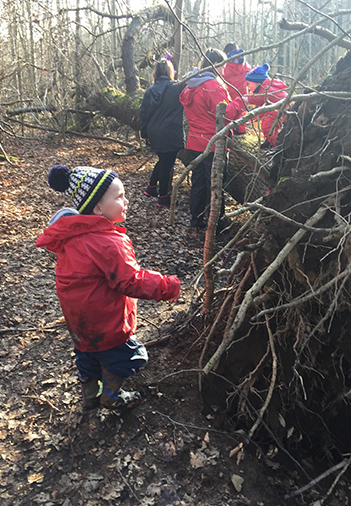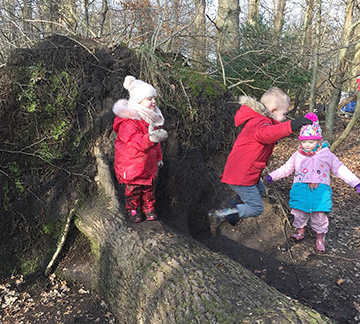Two Lethbridge College faculty expanded their knowledge of how to create a culture of outdoor play during a week-long study tour to Scotland.
Wendy Weninger, chair of the School of Human Services, and Early Childhood Education instructor Cheryl Hatten, spent Feb. 18 to 23 with about two dozen Canadians on this learning journey.
The tour was organized by Okanagan College and Inspiring Scotland, which tackles poverty, poor health and other social ills through initiatives including outdoor play.
Hatten says topics ranged from policy-making in support of early childhood development to outings with preschoolers and their caregivers.
Scotland presently provides 600 hours a year of free preschool education to all three- and four-year-olds. That commitment is set to nearly double by 2020.
The challenge of such a national mandate is in finding space for preschoolers. Low-cost “facilities” outdoors help.

“Outdoor play is taking off,” Hatten says. “We saw one program in one of the most deprived areas of Glasgow and the (child care) program is right next to a forest. They regularly take groups of children out into the forest.
“They’ll bring a wagon full of snacks. They have what they called a ‘pop-a-loo’ which is just a pop-up tent with a porta-potty inside. They bring jugs of water for handwashing and drinking. They’ve set up swings, logs for them to balance on, just a variety of things. They’ll spend two or three hours outdoor in this forest space then they’ll go back to the nursery school.”
A body of research shows unstructured outdoor play supports children’s physical, social and emotional health, and more.
“Developing a sense of place is very important in terms of environmental stewardship,” Hatten says. “If you take a child to the same place over and over and over again, they become connected to it.”
In the Glasgow forest, for example, adults began clearing litter from the forest.
“Once they realized how important those woods were to the children, they started to take better care of it as well.”
Hatten says she and Weninger saw children as young as three balancing on the trunks of fallen trees, carrying sticks and tugging on branches. Adults didn’t leap in to stop them, and no one was hurt.
Adults have to get comfortable with some level of risk and understand the difference between fear and the odds of those fears materializing.
“We’ve become a fear-based society,” Hatten says. “In reality, there has never been a safer time to be a child. There has been no spike in abductions or anything like that. We just hear about it because of technology.”
Benefits of outdoor play outweigh risk.
“We talk a lot in our program about our image of the child,” Hatten says. “Do we view children as innocent little beings who need protecting or are they capable and competent beings who are citizens and can do things by themselves?”
Scotland, and other countries, such as Norway, are making outdoor play the norm, inspiring Hatten to consider how to shift that culture here.
“One of the things we talked about in Scotland, is why are we teaching people about outdoor play inside?” Hatten says. “Maybe instead of looking at pictures, we actually go out and experience it and then we come back and talk about it.”
Weninger and Hatten joined an instructor and her college students for a class on outdoor play. Students built dens, created “transient art” with pine cones, twigs and leaves and painted with mud.
For two classes in March, Hatten warned her students to dress for the weather for outdoor instruction.
“We get a bit of distasteful weather and we think maybe we should just stay inside today,” she says. In fact, few winter or summer days are unsafe to be outdoors.

Next year, the college will offer its first course devoted entirely to outdoor play. Developed by Lethbridge College faculty, this may be a first in post-secondary early childhood education in Canada. It will be a required course for all students in the one-year certificate program.
The course builds on work Lethbridge College did in partnership with Okanagan College and the Lawson Foundation. The foundation’s research grant supported the development of specialized non-credit training on outdoor play for in-person or online delivery.
The Scotland tour filled Hatten’s head with ideas for more applied research on outdoor play’s impact on children and on communities.
“We never outgrow that need for the outdoors,” she says.